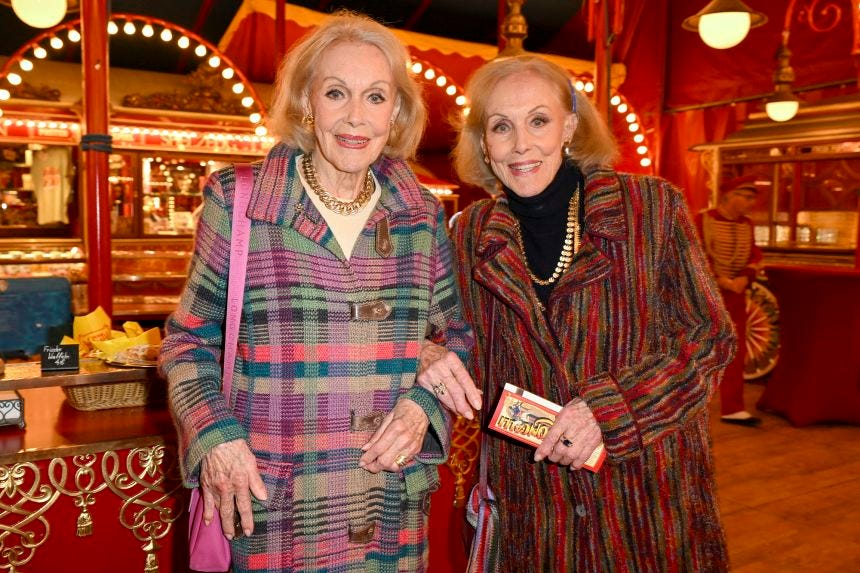Cultural Attack on Human Life: The Kessler Twins and Assisted Suicide
The Catholic Call to Defend the Dignity of Every Person
The news hit entertainment circles like a thunderclap this past Sunday. Alice and Ellen Kessler, the legendary twin performers who dazzled audiences alongside Frank Sinatra and Fred Astaire, chose to end their lives together through assisted suicide at age 89. Their synchronized final act, carried out with the help of Germany’s Society for Humane Dying, has reignited conversations about what the Catholic bishops of England and Wales recently called the “assault on the value of human life” sweeping across Western culture in 2025.
This story forces us to confront uncomfortable questions about human dignity, suffering, and the role society plays in protecting its most vulnerable members. As Christians, particularly those of us committed to Catholic teaching, we must grapple with the tragic reality that what our culture increasingly celebrates as “death with dignity” represents something far more sinister: the systematic devaluation of human life itself.
The Kessler Legacy: From Stardom to Synchronized Death
The Kessler twins built their careers on perfect synchronization. Born in Nazi Germany, they escaped with their family to West Germany in 1952 and launched themselves into entertainment history. Their performances at the Lido in Paris catapulted them to international fame, leading to appearances on “The Ed Sullivan Show” and “The Dean Martin Show.” They embodied glamour, precision, and an almost supernatural connection that captivated audiences worldwide.
Throughout their lives, the twins spoke often about their desire never to be separated. “The idea of one of us going first is very hard to bear,” they told Italian outlet Corriere della Sera last year. This sentiment, while touching in its demonstration of their bond, reveals something troubling about how our culture has redefined love itself.
The German Society for Humane Dying confirmed that the twins had been planning their deaths for over a year, with lawyers and doctors conducting preliminary discussions. According to German law, which legalized assisted suicide in 2020, individuals must be “absolutely clear-headed” and make decisions that are “thoughtful and consistent” over extended periods.
The Culture of Death Advances
What happened to the Kessler twins represents more than a personal tragedy; it symbolizes the broader cultural shift Pope John Paul II warned us about when he coined the term “culture of death.” This culture presents death as a solution to suffering, autonomy as the highest good, and individual choice as the ultimate moral arbiter.
The statistics are staggering. Assisted suicide accounts for one in 20 deaths in Canada, which leads the world in euthanasia rates. Germany legalized the practice in 2020. Nine European countries, along with Canada, Australia, New Zealand, and several others have embraced what they call “medical assistance in dying.” In the United States, ten states plus Washington D.C. have legalized the practice, with eight more states considering similar legislation.
The Catholic bishops of England and Wales captured the gravity of this moment perfectly in their November 2025 statement, expressing “deep sadness” over advancing assisted suicide legislation. They recognize what many secular observers miss: these laws represent a fundamental attack on human dignity itself.
Catholic Teaching: The Inviolable Dignity of Every Life
Catholic doctrine provides clarity in this moral confusion. The Church teaches that every human person possesses inviolable dignity from conception through natural death. This dignity stems from our creation in God’s image, a reality that remains unchanged by illness, disability, or age.
The Catechism of the Catholic Church states unambiguously that direct euthanasia “consists in putting an end to the lives of handicapped, sick, or dying persons” and “is morally unacceptable.” More than a rule, this teaching reflects profound truth about human nature and our relationship with God. We are stewards of our lives, holders in trust of something sacred that belongs ultimately to our Creator.
The Church also recognizes that suicide “contradicts the natural inclination of the human being to preserve and perpetuate his life” and “is gravely contrary to the just love of self.” This perspective offers liberation from the modern myth that individuals bear ultimate responsibility for determining their own worth and timing their own exit.
The Slippery Slope Becomes Reality
Critics of assisted suicide often invoke slippery slope arguments, warning that legal euthanasia will expand beyond terminally ill adults to include vulnerable populations. These warnings have proven prophetic. Canada now plans to offer euthanasia to the mentally ill and minors. The definition of “unbearable suffering” continues expanding, encompassing conditions far beyond terminal illness.
The Kessler twins’ case illustrates this expansion perfectly. They faced advanced age and the prospect of separation through death, circumstances that millions of elderly couples navigate without choosing suicide. Their synchronized death sends a chilling message: society now accepts that emotional distress justifies ending human life.
This normalization of suicide affects everyone, especially vulnerable populations who may feel pressured to choose death rather than burden their families or society. The Catholic bishops’ concerns about coercive control prove prescient as assisted suicide becomes increasingly viewed as a duty rather than a right.
The Christian Response: Defending Life in a Culture of Death
How should Christians respond to this cultural moment? First, we must understand that defending human life requires more than opposing euthanasia legislation. We must actively demonstrate the alternative: communities that embrace suffering members, families that care for aging relatives, and churches that walk alongside those facing life’s most difficult chapters.
The Catholic Church’s response to assisted suicide legislation offers a model. Rather than simply opposing death, Catholics promote life through hospice care, palliative medicine, and spiritual accompaniment. These alternatives demonstrate that suffering, while real and challenging, need never be faced alone and can serve purposes beyond our immediate understanding.
We must also address the underlying despair that drives people toward suicide. The Kessler twins’ fear of separation reveals deep spiritual poverty in our culture’s approach to death and dying. Christians have opportunities to offer hope rooted in eternal life, love that transcends physical separation, and communities that provide meaning beyond individual autonomy.
Practical Steps for Cultural Transformation
Individual Christians can take concrete actions to resist the culture of death. This includes supporting hospice organizations, volunteering with elderly populations, and advocating for policies that protect vulnerable people from pressure to end their lives. More fundamentally, we can model alternative approaches to aging, illness, and death within our own families and communities.
Churches play crucial roles in this cultural battle. They can provide education about Catholic teaching on human dignity, create support systems for families caring for aging members, and develop ministries that accompany people through terminal illness. These practical expressions of love offer compelling alternatives to assisted suicide.
Political engagement also matters. Christians must vote for candidates who protect human life from conception to natural death and oppose legislation that expands assisted suicide access. We can support organizations working to reverse euthanasia laws and promote life-affirming alternatives.
Hope Beyond the Headlines
The Kessler twins’ story need testify to more than cultural decline. Their lifetime of togetherness points toward deeper truths about human connection and love that transcends physical existence. Their synchronized death is nothing short of tragic, reminds us of the profound lengths people will go to in the name of toxic empathy, and we need to speak the Gospel into that sphere.
As Catholics, we believe in love stronger than death, hope that survives physical separation, and dignity that remains intact through every stage of human existence. These beliefs position us uniquely to offer alternatives to a culture increasingly convinced that death provides the ultimate solution to life’s challenges.
The battle for human dignity continues in legislative halls, hospital rooms, and family conversations across America. The Kessler twins’ final act serves as a sobering reminder that this cultural war affects real people facing real struggles. Our response must combine unwavering commitment to human dignity with practical love that makes that dignity visible to those most tempted to abandon it.
Human life possesses sacred worth that no suffering can diminish and no law can define away. This truth remains as constant as the God who created us in His image and calls us home in His timing. Our task involves witnessing to this truth through word and deed until our culture rediscovers the beauty of every human life from conception to natural death.









